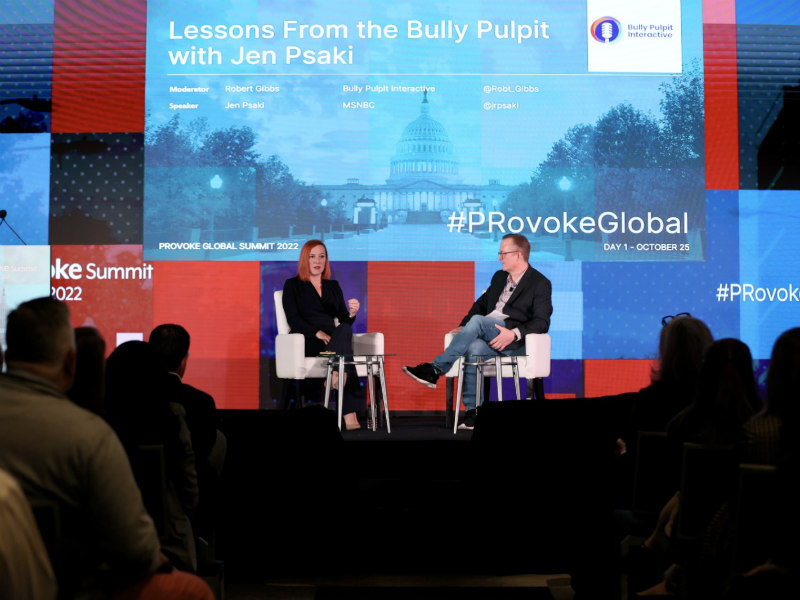Arun Sudhaman 25 Oct 2022 // 4:46PM GMT

WASHINGTON, DC — Despite the manner in which fake news has ravaged the democratic process in America, former White House press secretary Jen Psaki is only becoming more convinced that people still crave facts.
That was one of the key lessons Psaki shared during her headline slot at PRovokeGlobal in Washington DC this morning, where she was interviewed by another former White House press secretary — Bully Pulpit Interactive senior counsel Robert Gibbs.
Psaki's tenure at the White House began with the January 6 insurrection, and followed an era in which fake news — whether state-sponsored or otherwise — helped to reshape the nature of political discourse. But she told a full house of PRovokeGlobal delegates that her time as President Biden's press secretary only enhanced her belief that facts can still win the day.
"I’m a believer that people in the country do want accurate information and do want to know about substantive things," said Psaki. "I’m also a believer that they hate the back and forth rhetoric that you find in Washington."
That means not just thinking about the communications message, but also the audience — which can be an uncomfortable proposition at a time of significant polarisation. "The most important thing is what’s your message, but I would say there’s not enough thinking about how you reach your audience," explained Psaki. "I did Fox News Sunday more than any other show. You have to be honest with yourself about the size of an audience like that."
And while Psaki advised communicators that ignoring disinformation "doesn't make it go away", she noted that there are bigger risks when it comes to the people behind these techniques, whether journalists, elected representatives or governments.
"Most of the time, ignoring it doesn’t make it go away," said Psaki. "That is because of the speed at which information travels. Swift Boats is a case study that information is going to travel, even if you ignore it. When there is disinformation, the best response is accurate information.
"I think you can make a mistake by acknowledging people who are just trying to be outlandish," she continued, before bringing up a current example. "Marjorie Taylor Greene, for example, we didn’t talk about her for our first year of the White House, purposefully. I don’t know if that was necessarily right, but we decided if we did that, the headlines would be 'White House fights with Marjorie Taylor Greene'."
Psaki's experience in the State Department during Russia's first invasion of Ukraine in 2014, also helped shape these views, particularly with Russia Today journalists often present in the briefing room. "You just have to cut it off at the pass," she said. "You cannot let them spout inaccurate information or you have to fact check it in real time. Otherwise their questions are seen as on par with something like an ABC or the Washington Post. I don’t think that’s perfect but that’s what I learned in that room, that’s one way to minimise it."
Changing perceptions, added Gibbs, takes time, citing the journey to marriage equality in the US. Psaki noted that while facts are important — "always have the receipts" — information alone is not enough when it comes to changing minds.
"It’s not just about the words you use, it’s about what you have in your back pocket that makes people think of things in a way that they just didn’t," said Psaki. "Make somebody think that they maybe want to listen to you more and buy into your argument. The goal of communicating is not to have the last word or to yell over someone, it’s to make someone think that maybe they want to listen to you more and be open to your argument."
In that regard, said Psaki, "the ability to write coherently and clearly is undervalued." But so, perhaps, is the willingness of communicators to open themselves up to conflicting voices. "Things are constantly changing in the country and you can’t be so set in what you think and believe," explained Psaki. "The ability to talk to people you disagree with and read widely, would make you a good communicator."
Psaki reminded delegates that she had no paid media budget, necessitating a more creative approach to earned media. But she also discussed why a 'back-to-basics' approach served the White House well as it attempted to deal with the aftermath of the Trump presidency.
“The bar for me was to take the temperature down, and over time take the venom out of the [press briefing] room," she said. "We were going to reset the tone in the briefing room."
Even so, Psaki views much of the press briefing mechanism as somewhat outdated given how people access information these days. "What changed dramatically there was this massive explosion with the types of platforms you could engage with," she said. "I do think being creative beyond the traditional outlets of the networks and major daily newspapers is really vital — you can find that some of these reach far larger audiences. You can’t be so fragile about where you engage or where your boss engages."
Not that Psaki believes these shifts are necessarily positive, particularly when it comes to government communication. "What changed in a bad way is the way that Twitter [impacts] the conversations that happen in the briefing room," said Psaki. "80% of the country is not on Twitter — it’s very white, very liberal, very coastal. It kind of perpetuates this notion of people in Washington having this conversation with themselves. You kind of miss what’s happening in the country. It really does a disservice to the public when it comes to what the White House should be speaking to on a daily basis."


































.jpg)

















